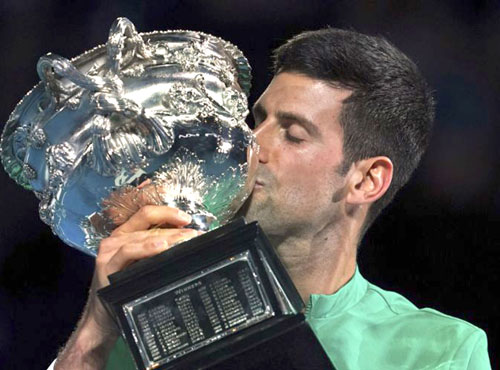Melbourne,
Maybe, just maybe, the thinking went, Novak Djokovic would be just a tad more susceptible to trouble this time around at the Australian Open.
After all, he tore an abdominal muscle in the third round and wasn’t sure he could continue to compete. Entering Sunday, Djokovic ceded five sets in the tournament, the most he ever dropped en route to a major final. And to top it all off, he was facing Daniil Medvedev, owner of a 20-match winning streak.
Yeah, right. We’re talking about Djokovic at Melbourne Park, where his dominance is most certainly intact — nine finals, nine championships. Plus, he’s still gaining on Roger Federer and Rafael Nadal in the Grand Slam standings, now up to 18 overall, two shy of the men’s record those rivals share.
Djokovic used improved serving, along with his usual relentless returning and baseline excellence to grab 11 of 13 games in one stretch and beat Medvedev 7-5, 6-2, 6-2 for a third consecutive Australian Open trophy.
“Definitely, emotionally, the most challenging Grand Slam that I ever had, with everything that was happening — injury, off-the-court stuff, quarantines,” Djokovic said. “A roller-coaster ride.”
When the match ended after less than two hours, Djokovic went to the sideline, lifted his white shirt and peeled pieces of beige athletic tape from his stomach.
“I was quite worried,” Djokovic said about the injury. “I did not (think) realistically that I could actually play. I didn’t know until two hours before the fourth-round match.”
Dealing with what he called “bearable” pain, Djokovic improved to a combined 18-0 in semifinals and finals on Melbourne’s hard courts.
“Probably, it’s not your last one,” Medvedev said. “I have no words to say.” Djokovic, a 33-year-old from Serbia, has won six of the last 10 majors and will stay at No. 1 in the rankings at least through March 8. That will give him 311 weeks there, breaking another mark held by Federer.
His goals now are squarely on Grand Slams, even more than before. Put Djokovic’s nine triumphs in Australia alongside five at Wimbledon, three at the U.S. Open and one at the French Open. The math looks good for him: He is about a year younger than Nadal and 6 1/2 younger than Federer.
“I do enjoy the success every single time even more,” Djokovic said, “because I know that the longer the time passes, the more difficult it’s going to become.”
The No. 4-seeded Medvedev was appearing in his second Slam final; he was the runner-up to Nadal at the 2019 U.S. Open.The 25-year-old from Russia had won 12 in a row against Top 10 opponents, but trying to solve Djokovic in Australia is a unique challenge.
“He’s really good (at) reading an opponent’s game,” Medvedev said, “knowing what you will do next, how to beat you.—AP










